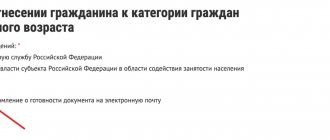Legal basis for payments upon liquidation
One of the grounds for dismissal of employees at the initiative of the employer is the liquidation of a legal entity or individual entrepreneur (clause 1 of Article 81 of the Labor Code of the Russian Federation). Each employee must be notified in advance of the upcoming dismissal (in writing and against signature), no less than:
- 2 months - in the general case (Article 180 of the Labor Code of the Russian Federation);
- 1 week - for seasonal workers (Article 296 of the Labor Code of the Russian Federation).
Dismissal during liquidation is accompanied by a number of mandatory payments:
- salary not received on the day of dismissal;
- compensation for unused vacation;
- severance pay.
For more information on calculating compensation for unused vacation, see the article “Calculation of compensation for unused vacation according to the Labor Code of the Russian Federation.”
Severance pay has 2 types:
- mandatory (Article 178 of the Labor Code of the Russian Federation);
- additional (Article 180 of the Labor Code of the Russian Federation).
Additional benefits differ from mandatory benefits in that they:
- accrued in case of termination of the employment contract before the expiration of the 2-month notice period;
- requires mutual consent of the employee and employer;
- Having the same value (average daily salary) as the basis for the calculation, it is determined for a different period: the number of working days falling within the period from the date of actual dismissal to the day of expiration of the 2-month notice period.
Documentation of dismissal of employees
The notice of the upcoming layoff is drawn up in any form, but it is necessary to convey the necessary information to the employee and receive a mark of familiarization with it. References to labor legislation are desirable. Familiarization with the documents and strict adherence to the procedure are mandatory, even if management believes that the state does not plan to challenge the administration's actions in court.
The order is drawn up in a unified or free form; it is necessary to display information about the dismissal, the grounds, and compensation made in connection with this. It is also recommended to comply with the rules of office work, indicate details of documents, positions, adherence to the general form and structure of the document, etc.
Entries in the work book are made as follows:
The employment contract was terminated due to the liquidation of the organization, paragraph 1 of part one of Article 81 of the Labor Code of the Russian Federation.
Procedure for paying severance pay
Mandatory severance pay is intended to pay a terminated employee for the time he or she will spend searching for a new job. The length of this time in the Labor Code of the Russian Federation is assessed as follows:
- no more than 3 months - in the general case (Article 178);
- 2 weeks - for seasonal workers (Article 296);
- no more than 6 months - for workers in the Far North (Article 318).
The benefit is paid monthly. In this case, payment for the 1st month (2 weeks for seasonal workers) is always made on the day of dismissal, along with other payments due to the employee upon dismissal. Thus, this payment is in no way related to the fact of subsequent employment.
Payment of benefits for subsequent months occurs upon their completion and subject to 2 conditions:
- the dismissed person is registered with the employment service no later than 2 weeks (in general, Article 178 of the Labor Code of the Russian Federation) and 1 month (for workers in the Far North, Article 318 of the Labor Code of the Russian Federation), counted from the date of dismissal:
- employment did not occur (if this happened before the end of the month in question, the days before starting a new job will be paid).
The fact of registration with the employment service begins to matter (the former employer will require a certificate from this service) to receive benefits for:
- 3rd month - in the general case (Article 178 of the Labor Code of the Russian Federation);
- 4-6 months - for workers in the Far North (Article 318 of the Labor Code of the Russian Federation).
The fact that the employee was not employed is confirmed by the absence of an entry in the work book.
How to tax severance pay paid upon liquidation of an organization with personal income tax and insurance contributions? The answer to this question was explained in detail by ConsultantPlus experts. To do everything correctly, get trial access to the system and go to the Ready solution. It's free.
Features of dismissal during the liquidation of special groups of employees
For pregnant women and women on maternity leave (these are categories of workers who usually enjoy additional guarantees upon dismissal) no privileges are provided upon dismissal in the event that the enterprise ceases its activities. Labor legislation and judicial practice do not give any reason to believe that they have any advantages over the rest of the staff, which is quite logical, because the organization is being liquidated and ceases its activities completely. Management should inform employees that such women need to register with the social security authorities, since all payments in connection with pregnancy, childbirth, and child benefits will be assigned by this body, as well as paid. Payment of maternity payments must be made exactly within the period specified by law, no later than the last day of work.
Pensioners do not have additional benefits, unlike pre-retirees. As part of the pension reform, a rule has been approved that such citizens, having registered with the central pension center and in the absence of employment due to the fault of this organization, have the right to count on early assignment of maintenance from the state.
Part-time workers and seasonal workers, unlike the rest of the staff, do not have the right to count on compensation in full. They can only count on severance pay. Seasonal workers are generally warned according to the general rule, that is, 7 days in advance and are paid two weeks' wages. Severance pay is not paid to employees who have entered into a fixed-term contract (for a period of up to 60 days), and they are warned about the upcoming dismissal only 3 days in advance.
The employment relationship with the manager who is a member of the liquidation commission (or who is the sole liquidator) is terminated last, as well as with the employees involved in the liquidation. It is the liquidation commission or liquidator that are the governing bodies in the process of formalizing the termination of the enterprise’s activities. The bankruptcy process provides for other positions and governing bodies.
Calculation of severance pay
The amount of the benefit for each month is determined as the average monthly salary of the employee (Articles 178, 296, 318 of the Labor Code of the Russian Federation). The average monthly salary is calculated by multiplying the actual number of working days falling during this period by the average daily salary of the dismissed employee. Accordingly, the amount of benefits attributable to an incomplete month will depend on the number of working days that fall within the period not worked in it.
Since the calculation is made separately for each person, taking into account the date of his dismissal, from which each paid month is counted, and his work schedule during work, the benefit amounts will always be individual.
For more information on the rules for calculating the average monthly salary in different situations, see the article “How to calculate the average monthly salary (formula)?”
The average daily salary is determined according to the rules established by the Labor Code of the Russian Federation (Article 139) and Decree of the Government of the Russian Federation dated December 24, 2007 No. 922, excluding from the calculation periods time periods not taken into account for these purposes:
- if the period worked is equal to or exceeds 1 year, the average daily salary will be equal to the amount of the actual salary received in the 12 months preceding the month of dismissal, divided by the actual number of days worked in these months;
- if the period worked is less than 12 months, then for the calculation they take data on salary and the number of working days for the actually worked period up to the month of dismissal;
- if an employee is hired and fired in the same month, the calculation period will be the time he actually worked (actual earnings and actual number of working days).
If the employer has set his own calculation period for calculating average earnings, which differs from 12 months, then he will have to do the calculation twice: according to the rules of the Labor Code of the Russian Federation and according to his own. The average daily salary calculated from your own pay period can be used when calculating benefits only if it is no less than that determined according to the rules of the Labor Code of the Russian Federation and Resolution No. 922.
Thus, the formula for calculating the amount of benefits for a full paid month in symbols will look like this:
Pos = SrmesZP = SrdnZP × RDfull,
where: Pos - the amount of severance pay;
Average salary - the amount of the average monthly salary;
Average salary - the average daily salary;
RDfull - the actual number of working days in a full month, calculated according to the work schedule of a specific dismissed employee.
For an incomplete month, the benefit will be calculated as follows:
Pos = SrdnZP × RDincomplete,
where: Pos - the amount of severance pay;
Average salary - the average daily salary;
RDincomplete - the actual number of working days in an incomplete month, calculated according to the work schedule of a specific dismissed employee.
The average daily salary will be:
SrdnZP = ZPrp / RDrp,
where: Average daily salary - average daily salary;
ZPrp - the amount of salary attributable to the billing period;
РДрп - the actual number of days worked in the billing period.
EXAMPLE of calculating severance pay from ConsultantPlus: The date of dismissal of an employee due to the liquidation of the organization is September 21, 2021. The average daily earnings of an employee is 1,142 rubles. The number of working days in the period... Get trial demo access to the K+ system and proceed to tips from experts. It's free.
Features of calculating average daily earnings
There are features of calculating the average daily wage, in particular:
- if a person quits on the last day of the month, average earnings are calculated for the last 12 months, including the period of dismissal. This position is set out in the letter of Rostrud dated July 22, 2010 N 2184-6-1;
- if a person did not work for the entire billing period (was ill or was on maternity leave, etc.), then the billing period must be replaced by 12 calendar months preceding the last month when the person went to work. Reason: letter of the Ministry of Labor dated November 25, 2015 N 14-1/B-972.
After the first month from the date of dismissal, the employer does not make any payments to the laid-off employee.
The essence of the 2021 changes in payments to employees upon liquidation
Amendments to the legislative acts introduced by the Law of July 13, 2020 No. 210-FZ and the Law of July 13, 2020 No. 203-FZ will not allow the employer to liquidate earlier until it fully pays off its employees dismissed due to liquidation .
At the same time, the employer retains the right, when dismissing employees, to pay them everything that is due for the period of employment immediately . That is, without waiting for the expiration of the time period, after which the next severance pay must be paid.
Stop it!
With the written consent of the employee, however, termination of the employment contract can occur before the expiration of 2 months. But in this case, the employee must be paid additional compensation in the amount of average earnings, calculated in proportion to the time remaining before the end of the notice period for dismissal (Part 3 of Article 180 of the Labor Code of the Russian Federation).
As soon as the established two-month period expires, the employer has the right to issue an order to dismiss the employee (unified form No. T-8a “Order “instruction” on the termination (termination) of an employment contract with employees (dismissal)", approved by Resolution of the State Statistics Committee of Russia No. 1 of January 5. 2004).
In accordance with Art. 84.1 of the Labor Code of the Russian Federation, the employee must be familiarized with the order to terminate the employment contract against signature. At the request of the employee, the employer is also obliged to issue a certified copy of the said order.
An entry in the work book about the termination of the employment contract is made after the employee familiarizes himself with the relevant order. The work certificate is issued on the day of termination of the contract.
In addition, upon a written application from an employee, the employer is also obliged to provide him with duly certified copies of documents related to work (Article 84.1 of the Labor Code of the Russian Federation). Such documents may be:
- The order of acceptance to work;
- dismissal order;
- salary certificate in form 2‑NDFL;
- a certificate of accrued and actually paid insurance contributions for compulsory pension insurance for the period up to the day of dismissal;
- payslips for the calculation and payment of wages for the period of work until the day of dismissal (decision of the Kuibyshevsky District Court of Irkutsk, Irkutsk Region No. 2–1833/2011 dated October 4, 2011).
When is compensation paid?
The laws under comment change the procedure for paying “compensation” in the following cases.
- Dismissal due to liquidation of the company (clause 1 of Article of the Labor Code of the Russian Federation).
- Dismissal due to reduction in headcount or staff (clause 2 of Article of the Labor Code of the Russian Federation).
ATTENTION
Article 178 of the Labor Code talks about the severance pay that a liquidated company must pay to a former employee. And not a word is mentioned about whether an individual entrepreneur who has ceased activity is obliged to provide “compensation”. The answer is contained in paragraph 9 of the Review of Judicial Practice of the Supreme Court No. 4 (2017) (approved by the Presidium of the Supreme Court on 11/15/17). It says: an individual entrepreneur does not have such an obligation if the employment contract does not contain such a condition. The specifics of labor relations between an entrepreneur and an employee are regulated by Chapter 48 of the Labor Code of the Russian Federation. And there is no provision in it for severance pay in the event of termination of the activities of an individual entrepreneur.
Submit documents for registering an LLC/IP or making changes to the Unified State Register of Legal Entities/Unified State Register of Individual Entrepreneurs via the Internet
Salary maintained during the period of employment
The payment specified in paragraph 4 is calculated at the end of the second month if the former employee presents the employer with a work book without an employment record and writes a statement. In this case, he needs to be paid wages for the period when he was unemployed. The employment period begins on the day following the day of dismissal and ends on the day preceding the day of new employment, or on the day of expiration of a two-month period from the date of dismissal, depending on which day came earlier (paragraph 2 of Article 14 of the Labor Code of the Russian Federation). In this case, the employee receives severance pay on the day of dismissal. Therefore, for the first non-working period, after its expiration, he will not receive anything, just as if he found a new job even a few days before the end of the second month. During this period of employment, wages are calculated including severance pay (paragraph 1 of Article 178 of the Labor Code of the Russian Federation) according to the formula:
average daily earnings X number of working days in the second month of employment before the day of hiring.
The amount of the average daily salary for this calculation is applied from the calculation given above for calculating severance pay. The number of working days is also determined according to the work schedule of the enterprise. For example, if an employee is fired on 06/06/2017, then the period for which he is entitled to compensation will begin on 07/07/2017 and end on 08/06/2017. If the employee is employed before the end of the second period, the days before being hired for a new job are taken into account.
To receive earnings for the third month, the former employee must bring a decision from the employment service about maintaining his average earnings. Such payment will be calculated in a manner similar to the previous compensation payment, in proportion to the days before hiring a new job.
Special situations considered by Rostrud specialists
| Question | Answer |
| The employee was dismissed due to the liquidation of the organization. Should the former employer pay him the average salary for the 2nd and 3rd months after dismissal? After his dismissal, the person contacted the employment service and was declared unemployed. | Average earnings for the 2nd month after dismissal are due if there is no entry in the work book about new employment. Average earnings for the 3rd month after dismissal are due if:
|
| The employer notified the employees of the upcoming dismissal due to liquidation, but then decided to extend the work period by 10 days. Do I need to give a new notice indicating the new date of dismissal? | If the employer wants to change the date of dismissal specified earlier in the notice, he must give the employee a new notice. If the exact date of dismissal was not included in the initial notice, then a new notice is not required. In any case, the period between the date of delivery of the notice and the date of dismissal cannot be less than two months. |
The employee is dismissed before the expiration of the two-month notice of dismissal due to the liquidation of the organization. The employer believes that on the day of dismissal the employee needs to list:
Is the employee entitled to any other benefits? | Yes, they do. The employer is also required to pay:
benefits. |
Guarantees for employees upon liquidation of a company
What was planned
The previous procedure did not ensure respect for the rights of employees dismissed due to the liquidation of the organization. There were cases when on the last working day a person received an average monthly salary, but could no longer claim benefits for the 2nd month of job search, since the employing organization ceased to exist. Because of this, part 1 of Article 178 of the Labor Code of the Russian Federation was declared contrary to the Constitution (Resolution of the Constitutional Court of the Russian Federation of December 19, 2018 No. 45-P).
Legislators have attempted to correct the situation. It was initially planned that two amendments would be made to the Federal Law of 08.08.01 No. 129-FZ “On State Registration of Legal Entities and Individual Entrepreneurs” (hereinafter referred to as Law No. 129-FZ).
- To register liquidation, you must provide, among other documents, confirmation that the organization has transferred to the dismissed persons all payments due under the Labor Code of the Russian Federation.
- The registration authority will not make a record of liquidation in the Unified State Register of Legal Entities until the period during which dismissed employees have the right to apply to their former employer for “compensation” has expired.
Who can be fired?
As is known, one of the grounds for terminating an employment relationship is termination of an employment contract in connection with the liquidation of an organization (that is, termination of its activities without transfer of rights and obligations to other persons) or termination of the activities of an individual entrepreneur (Clause 1, Part 1, Article of the Labor Code of the Russian Federation ).
This is the only basis for dismissal at the initiative of the employer, in which all employees are subject to dismissal. Including disabled people, those on vacation, minors and pregnant women.
The rules provided for dismissal in connection with the liquidation of an organization also apply when terminating employment contracts with employees of a branch, representative office or other separate division located in another locality, in the event of termination of its activities.
Salary for the period of employment and its taxation with personal income tax
Important: All compensation payments provided for by labor legislation are not subject to personal income tax and social contributions. Grounds: (clause 2, clause 1, article 20.2 of Law No. 125-FZ, article 217 of the Tax Code of the Russian Federation, article 422 of the Tax Code of the Russian Federation, letters from the Ministry of Finance: dated 03/17/2017 N 03-04-06/15529 and dated 05/23/2016 N 03-04-06/29283).
Features when paying compensation to employees during the liquidation of an organization exist for legal entities located in the Far North (Article 318 of the Labor Code of the Russian Federation). For employees of such organizations, compensation for dismissal due to liquidation is paid immediately for six months. The following order is provided:
- the first three periods without work are paid at the request of the former employee;
- the second three months without work - by decision of the employment service.
Unused vacation
In ch. 19 of the Labor Code of the Russian Federation provides for two categories of leave: annual basic paid leave, as well as additional leave. The latter is provided, for example, to employees with irregular working hours, employees with a special nature of work, as well as in other cases directly established by labor legislation.
...an employee who has entered into an employment contract for a period of up to 2 months does not have the right to receive severance pay...
Both categories are taken into account to determine the amount of compensation for unused vacation upon dismissal in connection with the liquidation of the organization (clause 1 of Article 127 of the Labor Code of the Russian Federation). It must be remembered that all employees, regardless of the actual duration of their positions in the liquidated company, have the right to receive full compensation for unused vacation. That is, even if an employee has worked for less than 6 months, he will receive compensation for the vacation due to him in the general manner.
According to Art. 120 of the Labor Code of the Russian Federation, the duration of the annual main and additional paid vacations is calculated in calendar days. Therefore, compensation is calculated based on the number of unused calendar days. It must be remembered that annual paid leave (lasting 28 calendar days - Article 115 of the Labor Code of the Russian Federation) is granted once during the employee’s year of work, counting from the date of entry to work. That is, once per working year, which begins from the first day of work under the employment contract.
In a situation where the working year has not been fully worked, vacation days for which compensation must be paid are calculated in proportion to the months worked.
Compensation for unused vacation is calculated in accordance with Art. 139 of the Labor Code of the Russian Federation, based on the calculation of 2.33 days of vacation per month. This number is multiplied by the number of months worked by the employee.
If the employee did not work completely for the last month, the following assumptions are used for the calculation.
Less than 15 days are not taken into account, and 15 days or more are rounded up to a whole month (letter of the Federal Service for Labor and Employment dated June 23, 2006 No. 944–6). Example
An employment contract with an employee was concluded on April 15, 2009. From April 15, 2009 to August 17, 2012, the total duration of actually used annual paid leave was 53 calendar days. Starting from 04/15/2009, the employee had the right to the following number of days of annual paid leave: - 04/15/2009 - 04/15/2010 (1st working year): 28 calendar days; — 04/15/2010 – 04/15/2011 (2nd working year): 28 calendar days; — 04/15/2011 – 04/15/2012 (3rd working year): 28 calendar days; — 04/15/2012 – 08/17/2012 (4th working year): 2.33 calendar days x 5 months = 11.65 calendar days. In total, during the period of his labor activity in this organization, the employee had the right to 95.65 calendar days of annual paid leave. Since 53 of them were used, 42.65 calendar days will be taken into account to calculate compensation, and according to the established rounding rules, 43 calendar days should be paid. Rounding always occurs upward, in favor of the employee (letter of the Ministry of Health and Social Development of Russia dated December 7, 2005 No. 4334–17). The total amount of compensation will be determined by the employer: the average daily earnings are multiplied by the number of calendar days of unused vacation. As a general rule, the average daily earnings for payment of vacations granted in calendar days and payment of compensation for unused vacations are calculated by dividing the amount of wages actually accrued for the billing period by 12 and by the average monthly number of calendar days (29.4) (clause 10 Decree of the Government of the Russian Federation No. 922 of December 24, 2007 “On the specifics of the procedure for calculating average wages”).
Ordered to be liquidated
The employee learns about the liquidation of the enterprise from the employer, who warns about the upcoming dismissal. Each employee is notified personally against signature, as a general rule, no less than 2 months before dismissal (Part 2 of Article 180 of the Labor Code of the Russian Federation (Labor Code of the Russian Federation). An employee engaged in seasonal work is notified no less than 7 calendar days ( Article 296 of the Labor Code of the Russian Federation).
The notice must be drawn up in two copies - one each for the employee and the employer. According to Art. 14 of the Labor Code of the Russian Federation, the two-month period begins the next day after the employee signs the notice of dismissal.
In addition, when making a decision on liquidation, an organization must notify the employment service authorities in writing no later than 2 months before, and an individual entrepreneur no later than 2 weeks before the start of the relevant activities. In this case, it is necessary to indicate the position, profession, specialty and qualification requirements, conditions of payment for each specific employee (clause 2 of Article 25 of the Law of the Russian Federation of April 19, 1991 No. 1032–1 “On Employment of the Population in the Russian Federation”).
It should be noted that this rule is a very important guarantee of workers' rights. Indeed, in the event of failure to comply with the established notification procedure, the dismissal order may be declared illegal by the court, and the employer will be obliged to reinstate the employee to the position held before the dismissal. See in this regard:
- decision of the Ussuri District Court of the Primorsky Territory, composed of presiding judge S. P. Moiseev, on the claim of O. N. Bataeva against the Federal State Institution “Pokrovskaya KECh District” of the Ministry of Defense of the Russian Federation;
- decision of the Ivanovsky District Court of the Ivanovo Region in case No. 2–1161/10 on the claim of G. N. Karpova against the Kolyanovsky Cultural and Leisure Municipal Institution.
conclusions
And in conclusion, we note that the changes introduced provide additional guarantees to employees in the event of their dismissal due to the liquidation of the company. At the same time, one cannot ignore the Russian mentality. We are talking about unofficial wages, forcing workers to write a statement “of their own free will.” Considering that the main reason for the liquidation of companies is losses and the inability to pay off their debts, the employer will try to avoid additional payments to employees.
Lawyers will be able to provide competent and professional advice on labor law issues. Fill out the form if you need qualified legal assistance:






